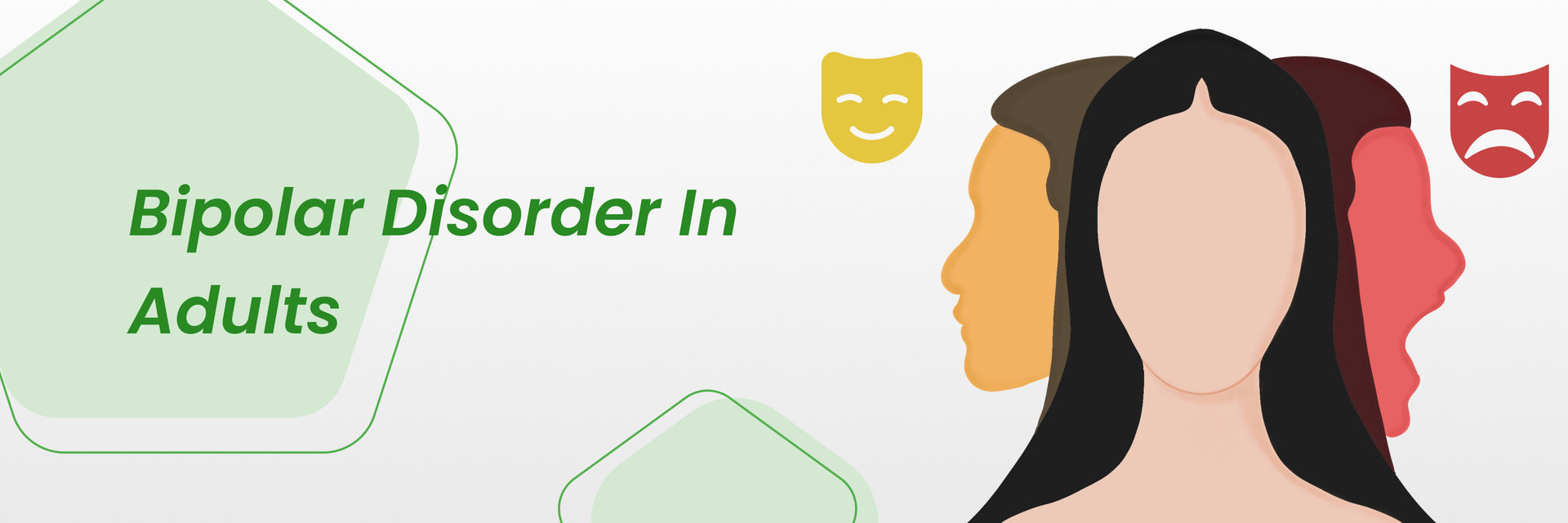,
Overview
Bipolar disorder, also known as manic-depressive illness. It is a mental health condition that affects a person’s mood, energy, activity level, and ability to function in daily life. Those who have bipolar disorder experience extreme highs (mania or hypomania) and lows (depression). This can last for weeks, or even months. The mood swing affects the person’s relationships, work, and other areas of life.
Talking about dementia, it is a gradual decline in mental ability that interferes with a person’s daily life. It is not a specific disease but a group of symptoms that affect the brain's functioning. Memory loss, confusion, and poor judgment are some of the symptoms of dementia.
According to the WHO, the estimated global prevalence of bipolar disorder is 1%. It affects both men and women equally. As for dementia, it is estimated that 50 million people worldwide have it. 10 million new cases come up every year. Most people who have dementia are over the age of 85.
Are you aware of the surprising link between bipolar and dementia? Keep reading to discover how these conditions can intersect and what the treatment can be!

Can bipolar disorder increase the risk of developing dementia?
Studies suggest that individuals with bipolar disorder have an increased risk of developing dementia later in life.
- One study found that people with bipolar disorder were 3 times more likely to develop dementia than those without bipolar.
- Another study showed that the risk of dementia increased as the number of manic or depressive episodes increased.
Your health is too important to ignore – schedule your appointment now.
Note: However, it is important to note that not all individuals will have bipolar and dementia together. It is not necessary that you will surely have dementia if you have bipolar. Further research is needed to fully understand the link between the two conditions.
What are the similarities and differences between bipolar disorder and dementia?

Bipolar and dementia share some similarities in terms of symptoms. Both have symptoms like memory problems, difficulty with attention, and changes in mood and behavior. Both conditions have been associated with changes in the gray matter volume and white matter integrity of the brain. Also, bipolar and dementia are linked to increased levels of inflammation and oxidative stress in the brain.
Do you know how to differentiate between bipolar disorder and dementia? Read below to understand the difference!!
Differences between bipolar and dementia are mentioned in the table below:
Bipolar | Dementia |
Affects younger people mostly | Condition is common among older adults. |
Characterized by episodes of mania and depression | Gradual decline in cognitive function |
Smaller brain volumes in the prefrontal cortex and hippocampus | People have brain changes like amyloid plaques and neurofibrillary tangles. |
What are the symptoms of bipolar and dementia?

The symptoms of bipolar and dementia are mentioned in the table below:’
| Symptoms | Bipolar disorder | Dementia |
| Mood changes | Episodes of depression and mania/hypomania | Mood changes, including depression and agitation |
| Memory loss | May have difficulty with short-term memory | Difficulty with short-term as well as long-term memory loss |
| Cognitive issues | Problems with concentration and decision-making | Problems with judgment, reasoning, and problem-solving |
| Behavioral changes | Engage in impulsive or risky behavior | Exhibit apathy, agitation, or aggression |
| Hallucinations and delusions | Experience hallucinations or delusions during manic or depressive episodes | Experience hallucinations or delusions in later stages |
| Sleep disturbances | Experience insomnia or oversleeping during mood episodes | Difficulty sleeping or experiencing daytime drowsiness |
| Communication issues | Speak rapidly or incoherently during manic episodes | Difficulty finding the right words or following a conversation |
Are you aware of the various kinds of bipolar and dementia? Scroll down to learn about the different types of bipolar disorder and dementia!
Note- If you are facing any of these symptoms it's very important to visit a hospital for better treatment.
What are the types of bipolar and dementia?
The types of bipolar disorder are discussed in the table below:
| Type of bipolar disorder | Description |
| Bipolar I disorder | This is characterized by one or more manic episodes. Each episode is followed by another hypomanic or depressive episode. |
| Bipolar II disorder | Characterized by one or more major depressive episodes and at least one hypomanic episode, but no manic episodes. Hypomania is a milder form of mania, with similar but less severe symptoms. |
| Cyclothymic disorder | Characterized by numerous periods of hypomanic symptoms and depressive symptoms. It may last for at least two years in adults and one year in children. It does not meet the criteria for a major depressive episode or a hypomanic episode. |
The below table shows the types of dementia:
| Types of dementia | Description |
| Alzheimer's disease | This is the most common type. Characterized by a gradual decline in memory, thinking, and reasoning skills. Alzheimer's disease is associated with the accumulation of beta-amyloid plaques and tau protein tangles in the brain. |
| Vascular dementia | Second most common type. Caused by reduced blood flow to the brain, which can damage or kill brain cells. Symptoms may include difficulty with planning, organizing, and decision-making. There can also be issues with movement or balance. |
| Lewy body dementia | It has characteristics of both Alzheimer's and Parkinson's disease. Characterized by memory loss and hallucinations. There can also be movement problems like tremors or stiffness. |
| Frontotemporal dementia | It affects the frontal and temporal lobes of the brain. Leads to changes in behavior, personality, and language skills. There are three subtypes of frontotemporal dementia: behavioral variant, semantic variant, and progressive nonfluent aphasia. |
| Mixed dementia | A combination of two or more types of dementia. Commonly Alzheimer's disease and vascular dementia. |
| Parkinson's disease dementia | Dementia develops in people with Parkinson's disease. Characterized by symptoms such as memory loss and difficulty with planning and decision-making. |
| Creutzfeldt-Jakob disease | A rare and rapidly progressive type of dementia. It is caused by prion proteins. Symptoms may include rapid memory loss, confusion, and behavior changes. Also, include movement symptoms such as muscle stiffness and twitching. |
| Huntington's disease | It causes progressive damage to the brain and nervous system. Symptoms may include movement problems, cognitive decline, and behavioral changes. |
| Wernicke-Korsakoff syndrome | Dementia is caused by a deficiency in thiamine (vitamin B1). This is often caused due to alcohol misuse. Symptoms may include confusion, memory loss, and difficulty with balance and coordination. |
Is it possible for a person with bipolar disorder to also have dementia?

Yes, it is possible for a person with bipolar disorder to also have dementia. There are possibilities that bipolar and dementia co-occur in some people. According to the National Institute of Mental Health, people with bipolar disorder are at an increased risk for developing cognitive problems and dementia. This is caused by various factors. They are:
- Effect of mood episodes on the Brain
- Genetic vulnerability
- Smoking or a poor diet
Studies by Alzheimer's Association also suggest that Bipolar disorder increases the risk of developing Alzheimer’s disease or other types of dementia.
According to New Waters Recovery, an addiction and mental health treatment center states that -
Genetics is believed to play an important role in the development of both bipolar disorder and dementia. Studies have shown that a person’s risk for developing either condition increases if they have a family history of the conditions, as certain genetic variations can increase an individual’s vulnerability to developing them. It is therefore important to consider any family history when assessing an individual’s risk for either condition. However, it should be noted that even if there is no known family history of either condition, it still does not rule out the possibility of developing one or the other down the line. Therefore, regular monitoring and assessment by a psychiatrist is recommended.
Take charge of your health and your life. Contact us today!
What are the approaches to managing bipolar and dementia together?

Managing bipolar and dementia together can be challenging. Both conditions require specialized care and treatment. However, several approaches are there to manage both conditions at the same time:
- Medications- Mood stabilizers and atypical antipsychotics can be used to manage symptoms of both bipolar disorder and dementia.
- Nonpharmacological methods - Cognitive behavioral therapy or environmental modifications are some of the effective ways.
- Multidisciplinary approach - Healthcare professionals from various specialties can provide comprehensive treatment.
Can electroconvulsive therapy (ECT) be used to treat bipolar disorder in people with dementia?
Electroconvulsive therapy (ECT) is a medical treatment that involves passing a small electric current through the brain. The procedure is performed under general anesthesia. Electrodes are placed on the scalp to deliver the current. ECT is used to treat severe mental health conditions such as major depression, bipolar disorder, and schizophrenia. ECT is used when all other treatments have failed to respond. ECT changes the levels of certain neurotransmitters in the brain.
While ECT can be effective for treating severe conditions of bipolar and dementia, it is generally not recommended for such people. The reason is the cognitive impairment associated with dementia. Due to this, there is difficulty in getting informed consent for the treatment from the patient. ECT can also have adverse side effects like confusion, memory loss, and delirium.
Also, ECT can worsen cognitive impairment in some cases. It is sometimes less effective in people with dementia compared to those without the condition. As a result, other treatment options such as medications and non-pharmacological interventions are preferred for managing bipolar and dementia.
Can medications used to treat bipolar disorder worsen dementia symptoms?

Some medications used to treat bipolar disorder may worsen dementia symptoms. For example, antipsychotic medications such as haloperidol and chlorpromazine may increase the risk of cognitive decline and other adverse effects in patients with dementia.
However, new antipsychotic drugs like risperidone and olanzapine are better tolerated by dementia patients and reduce symptoms like agitation and aggression.
Mood-stabilizing medications like lithium and valproate cause side effects such as memory problems and confusion. But sometimes, these medications are effective to treat mood symptoms of bipolar disorder in people with dementia.
Whether there will be side effects depends upon careful consideration of risks and benefits.
Want to inquire your about personalized treatment expenses? Don't hesitate. Talk to us today.
Note: Taking any medication without a doctor's advice is strictly not recommended.
If you or a loved one are struggling with bipolar disorder and dementia, you're not alone. Read on to learn about the resources and support available for managing these challenging conditions.
Support and Resources for Individuals and Families
The diagnosis of bipolar and dementia may be challenging. It can significantly affect individuals as well as their families. Fortunately, a variety of support and resources are available to help them cope with these conditions.
Some of the resources and support available include:
- Support groups: Alzheimer's Association and National Alliance on Mental Illness(NAMI) offer support groups for emotional support, education, and practical advice.
- Counseling and therapy: This can help manage emotions and reduce stress for both individuals and caregivers.
- Educational resources: Webinars, videos, and online courses provide information on diagnosis, treatment, and management.
- Respite care: Provides a break for caregivers to prevent burnout and take care of their own health needs.
- Financial assistance: Programs like Medicaid, Medicare, and veterans' benefits can help with the cost of care.
Bipolar and dementia in the elderly

Bipolar disorder and dementia are both relatively common in the elderly population. The co-occurrence of these conditions is less well studied. Bipolar disorder affects around 1% of people aged 65 and older, while dementia affects around 5-8% of people in this age group.
Bipolar disorder and dementia in the elderly can be challenging to diagnose and treat.
A typical feature of bipolar disorder and shared symptoms with dementia can complicate diagnosis. A comprehensive evaluation and biomarkers can help differentiate the two conditions. Treatment requires a multidisciplinary approach, including mood stabilizers and atypical antipsychotics. Non-pharmacological interventions and support groups can also be beneficial. Early and accurate diagnosis, along with a combination of interventions, can improve outcomes and quality of life.
FAQs

1. Can bipolar disorder be misdiagnosed as dementia?
Yes, bipolar disorder can sometimes be misdiagnosed as dementia, particularly in older adults. This is because some symptoms of bipolar disorder, such as forgetfulness and confusion during a manic episode, can resemble symptoms of dementia.
2. Is there a link between bipolar disorder and early-onset dementia?
Research suggests that individuals with bipolar disorder may be at a higher risk of developing early-onset dementia, particularly if they have a history of hospitalization for their bipolar disorder.
3. Can medication for bipolar disorder increase the risk of dementia?
Some medications used to treat bipolar disorder, such as antipsychotics, have been linked to an increased risk of dementia. However, this risk appears to be small and needs to be balanced against the benefits of the medication.
4. Can early diagnosis and treatment of bipolar disorder reduce the risk of developing dementia?
While more research is needed in this area, early diagnosis and effective treatment of bipolar disorder may help reduce the risk of developing dementia.
5. Is there a difference in the treatment approach for bipolar disorder and dementia?
Yes, the treatment approach for bipolar disorder focuses on stabilizing mood and preventing relapses, while the treatment approach for dementia focuses on managing symptoms and improving quality of life.
6. Can bipolar disorder and dementia coexist in the same individual?
Yes, it is possible for an individual to have both bipolar disorder and dementia, particularly in older adults. This can make diagnosis and treatment more complex.
7. Can lifestyle changes like exercise and a healthy diet help reduce the risk of developing bipolar disorder and dementia?
While lifestyle changes are important for overall health, there is no clear evidence that these changes can specifically reduce the risk of developing bipolar disorder or dementia.
8. Is there a genetic component to the link between bipolar disorder and dementia?
There appears to be a genetic component to both bipolar disorder and dementia, but more research is needed to fully understand the relationship between the two conditions.
References:
https://www.alz.org/alzheimer_s_dementia
https://www.webmd.com/bipolar-disorder/default.htm






